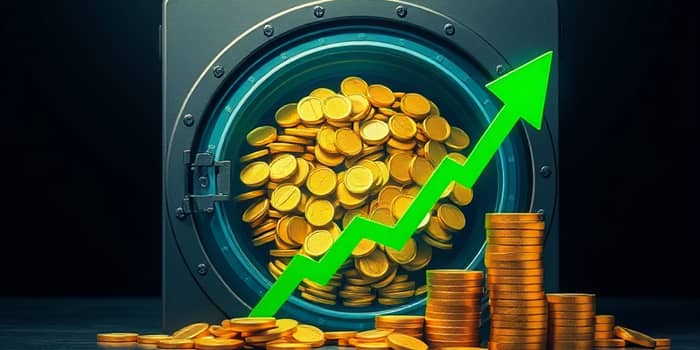In a world of evolving interest rates and uncertain markets, high-yield savings accounts can be a safe harbor for growing your cash reserves. By offering rates up to ten times higher than the national average, these accounts empower savers to beat inflation and reach goals faster.
Whether you are planning for an emergency fund, saving for a major purchase, or simply seeking a secure place to park idle cash, understanding the nuances of these accounts is essential for maximizing returns while maintaining liquidity and safety.
Definition and Overview
A high-yield savings account (HYSA) is designed to deliver a much higher interest rate compared to traditional savings options. These accounts use the annual percentage yield framework to compound earnings and showcase the true growth potential over time.
While the average APY for standard savings hovers around 0.41% to 0.59%, top high-yield accounts now boast rates up to 5.00% or more. That means your money can work harder without taking unnecessary risks.
Current Top Rates and Examples
As of April–May 2025, the following institutions lead the pack with competitive APYs:
This range illustrates how a difference of just a few percentage points can boost your balance significantly over one year. For example, $1,000 at 5.00% yields $1,050, compared to $1,004 at 0.41%, delivering an extra $46 annually.
How High-Yield Savings Accounts Work
Most high-yield accounts calculate interest using daily or monthly compounding, then credit it to your balance each month. This means your earnings also generate returns, and the overall growth accelerates over time.
The formula for APY accounts for compounding, giving you a more accurate reflection of potential earnings. You can deposit or withdraw funds easily, making these accounts as liquid as traditional savings while benefiting from compounded daily, monthly, or quarterly distributions.
Safety and Insurance
Funds deposited in HYSAs held at FDIC-insured banks are protected up to $250,000 per depositor, per bank, per ownership category. Credit union offerings enjoy similar coverage through NCUA insurance.
This federal insurance guarantees your money even if the institution fails, providing peace of mind as you grow your emergency reserves or plan for short-term goals.
Why Banks Offer Higher Yields
Online-only banks and fintech platforms can sustain higher rates because they incur lower overhead costs, such as branch maintenance and staffing. These savings are often passed on to customers through elevated APYs.
Traditional brick-and-mortar banks like Chase, Bank of America, and Wells Fargo typically offer standard savings rates near 0.01%, reflecting higher operating expenses and legacy systems that reduce flexibility.
Key Features to Compare
When evaluating high-yield savings accounts, you should look beyond APY alone. A truly optimized choice balances interest rates with user experience and cost structure.
- APY and rate change frequency: Ensure you know how often rates can adjust and how they compare across institutions.
- Compounding frequency: More frequent compounding can lead to faster growth.
- Fees: Verify if there are monthly service or maintenance charges.
- Minimum deposit and balance requirements: Some banks require a threshold to open or to earn the highest APY.
- Customer service options: Evaluate phone, email, or live chat support quality.
- Access channels: Check transfer methods (ACH, wire), ATM networks, and withdrawal limits.
- Account bonuses: Some banks offer cash incentives for new accounts.
Pros and Cons
Understanding the trade-offs helps you choose an HYSA that aligns with your goals and banking style.
- Significantly higher interest rates can accelerate your savings without market risk.
- No or low monthly fees at many online banks mean more money stays in your pocket.
- Flexibility to add or withdraw funds without early withdrawal penalties.
- Access to advanced digital tools and mobile apps for easy management.
- APYs can fluctuate as Federal Reserve rates change, affecting predictability.
- Some accounts impose minimum balance or deposit requirements.
- Lack of physical branches may be an issue for those preferring face-to-face service.
- Federal rules may limit withdrawals, though many banks are relaxing these caps.
Who Should Consider a HYSA?
High-yield savings accounts are ideal for individuals saving for short- to medium-term goals such as an emergency fund, vacation, or home down payment. They also suit those who prefer a low-risk vehicle over stock market exposure.
If you are comfortable managing cash online and want to maximize interest without locking funds away in certificates of deposit, an HYSA could be the right choice.
Tips for Maximizing Benefits
Setting up automatic transfers is one of the simplest ways to build your balance consistently. Directing a portion of each paycheck into your HYSA removes the temptation to spend and harnesses the power of regular contributions.
Additionally, regularly comparing rates across top providers ensures you maintain the highest possible yield as market conditions shift. Consider opening multiple accounts to take advantage of promotional offers or tiered rate structures.
Conclusion
High-yield savings accounts combine the security of federal insurance with the potential for robust returns, making them a compelling option for savvy savers. By understanding how rates work, what features matter most, and how to optimize your strategy, you can accelerate your financial goals without undue risk.
Start by researching current APYs, comparing key features, and setting a plan for automatic contributions. With the right approach, your cash can thrive in today’s dynamic interest rate environment, bringing you closer to both short-term needs and long-term aspirations.
References
- https://www.americanexpress.com/en-us/banking/online-savings/articles/all-about-high-yield-savings/
- https://www.nerdwallet.com/best/banking/high-yield-online-savings-accounts
- https://www.pnc.com/insights/personal-finance/save/what-is-a-high-yield-savings-account.html
- https://www.nerdwallet.com/article/banking/high-interest-savings-account
- https://www.bankrate.com/banking/what-is-a-high-yield-savings-account/
- https://www.investopedia.com/best-high-yield-savings-accounts-4770633
- https://www.ourfirstfed.com/support/financial-education/basics-of-high-yield-savings-accounts
- https://www.synchrony.com/blog/bank/what-is-a-high-interest-savings-account










